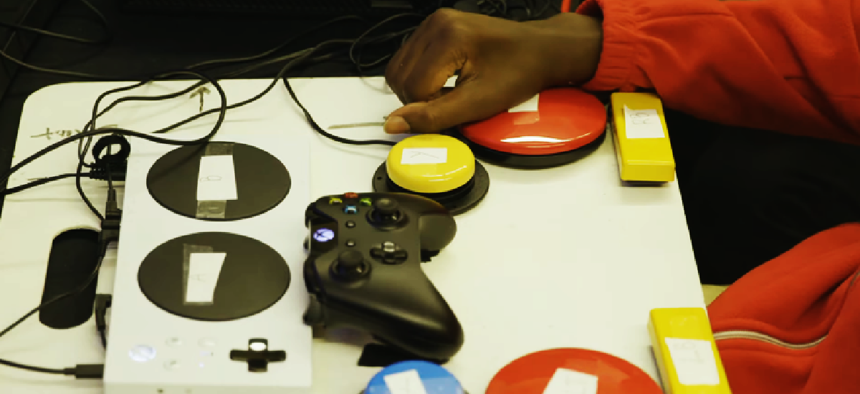Adaptive controllers put injured vets back in the game


Connecting state and local government leaders
The Department of Veterans Affairs plans to use adaptive controllers in gaming sessions designed to assist mental and physical rehabilitation and improve socialization for veterans with limited mobility.
The Department of Veterans Affairs is using Xbox adaptive controllers designed for gamers with limited mobility as an alternative form of therapy.
Under the terms of a partnership with Microsoft announced in April, the tech giant donated controllers, along with Xbox One S consoles, games, PDP one-handed joysticks, buttons and switches to the VA to be used at 22 rehab centers. The VA plans to use them in gaming sessions designed to assist mental and physical rehabilitation and improve socialization for veterans with limited mobility.
Colleen Virzi, a VA recreational therapist who coordinates all the adaptive sports therapies, said having different options, such as large, 6-inch-wide buttons on the controllers, foot pedals and joysticks, allow gamers to customize their experience -- which she said she hopes will yield favorable health outcomes.
"It's a unique piece of equipment because no matter what type of disability you have, you can adjust it to work for you," she said, adding that gaming can help with fine motor skills, improve competitiveness and socialization.
The plan, Virzi said, is to have a weekly outpatient clinic for about two hours. Veterans will get fitted for their controllers and compete against other veterans, with the ultimate goal of going home and playing with their families and friends," she said.
The Veterans Health Administration plans to collect data on veterans gaming and how adaptive controllers affect patient outcomes, particularly regarding spinal cord injuries and conditions.
"It's really early in the collection of data and the efficacy of the controllers on clinical outcomes," said Larry Connell, chief of staff for the Veterans Health Administration.
The VHA is also focused on suicide prevention and is studying how gaming could help through increasing comradery with fellow veterans. "One of the things we've found is that … soldiers and sailors and airmen that come out of the military is they lose that camaraderie. We think that's one of the indicators that if we could fix that, we think we can move the needle on suicides," Connell said.
Sharing the data presents usability and security concerns, however. Michael Heimall, director of the VA Medical Center in Washington, D.C., said that while he wants to make the deluge of patient data usable, he's also tuned into data privacy concerns.
"I worry all the time with electronic health records," Heimall said. "The way we communicate is based on that electronic health record, and if you don't read the one note that has the pertinent piece of information that you need, you've got an opportunity to have a bad outcome. How do you use artificial intelligence and machine learning to really add value to what's in those databases."
The 2018 VA Mission Act allows the department to share information with non-VA providers and requires veterans to opt out of the data-sharing starting Oct. 1 rather than opting in.
"There's a tremendous amount of anxiety among the veteran population," Heimall said, "so people are very sensitive to how their personal information -- not just their health information" is shared.
A longer version of this article was first posted to FCW, a sibling site to GCN.





